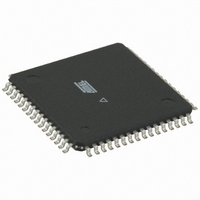ATSAM3S1BA-AU Atmel, ATSAM3S1BA-AU Datasheet - Page 58

ATSAM3S1BA-AU
Manufacturer Part Number
ATSAM3S1BA-AU
Description
IC MCU 32BIT 64KB FLASH 64LQFP
Manufacturer
Atmel
Series
SAM3Sr
Specifications of ATSAM3S1BA-AU
Core Processor
ARM® Cortex-M3™
Core Size
32-Bit
Speed
64MHz
Connectivity
I²C, MMC, SPI, SSC, UART/USART, USB
Peripherals
Brown-out Detect/Reset, DMA, I²S, POR, PWM, WDT
Number Of I /o
47
Program Memory Size
64KB (64K x 8)
Program Memory Type
FLASH
Ram Size
16K x 8
Voltage - Supply (vcc/vdd)
1.62 V ~ 1.95 V
Data Converters
A/D 10x10/12b, D/A 2x12b
Oscillator Type
Internal
Operating Temperature
-40°C ~ 85°C
Package / Case
64-LQFP
Controller Family/series
ATSAM3S
No. Of I/o's
47
Ram Memory Size
16KB
Cpu Speed
64MHz
No. Of Timers
6
Rohs Compliant
Yes
Processor Series
ATSAM3x
Core
ARM Cortex M3
3rd Party Development Tools
JTRACE-CM3, MDK-ARM, RL-ARM, ULINK2
Development Tools By Supplier
ATSAM3S-EK
Lead Free Status / RoHS Status
Lead free / RoHS Compliant
Eeprom Size
-
Lead Free Status / Rohs Status
Details
Available stocks
Company
Part Number
Manufacturer
Quantity
Price
- Current page: 58 of 1118
- Download datasheet (24Mb)
10.5.5
58
SAM3S Preliminary
Bit-banding
Memory accesses to Strongly-ordered memory, such as the system control block, do not require
the use of DMB instructions.
A bit-band region maps each word in a bit-band alias region to a single bit in the bit-band region.
The bit-band regions occupy the lowest 1MB of the SRAM and peripheral memory regions.
The memory map has two 32MB alias regions that map to two 1MB bit-band regions:
Table 10-6.
Address
range
0x20000000-
0x200FFFFF
0x22000000-
0x23FFFFFF
• Vector table. If the program changes an entry in the vector table, and then enables the
• Self-modifying code. If a program contains self-modifying code, use an ISB instruction
• Memory map switching. If the system contains a memory map switching mechanism, use a
• Dynamic exception priority change. When an exception priority has to change when the
• Using a semaphore in multi-master system. If the system contains more than one bus
• accesses to the 32MB SRAM alias region map to the 1MB SRAM bit-band region, as shown
• accesses to the 32MB peripheral alias region map to the 1MB peripheral bit-band region, as
corresponding exception, use a DMB instruction between the operations. This ensures that if
the exception is taken immediately after being enabled the processor uses the new exception
vector.
immediately after the code modification in the program. This ensures subsequent instruction
execution uses the updated program.
DSB instruction after switching the memory map in the program. This ensures subsequent
instruction execution uses the updated memory map.
exception is pending or active, use DSB instructions after the change. This ensures the
change takes effect on completion of the DSB instruction.
master, for example, if another processor is present in the system, each processor must use
a DMB instruction after any semaphore instructions, to ensure other bus masters see the
memory transactions in the order in which they were executed.
in
shown in
Table 10-6
– Use an ISB instruction to ensure the new MPU setting takes effect immediately after
programming the MPU region or regions, if the MPU configuration code was
accessed using a branch or call. If the MPU configuration code is entered using
exception mechanisms, then an ISB instruction is not required.
Table
SRAM memory bit-banding regions
Memory
region
SRAM bit-band
region
SRAM bit-band alias
10-7.
Instruction and data accesses
Direct accesses to this memory range behave as SRAM
memory accesses, but this region is also bit addressable
through bit-band alias.
Data accesses to this region are remapped to bit band
region. A write operation is performed as read-modify-write.
Instruction accesses are not remapped.
6500C–ATARM–8-Feb-11
Related parts for ATSAM3S1BA-AU
Image
Part Number
Description
Manufacturer
Datasheet
Request
R

Part Number:
Description:
KIT EVAL FOR ATSAM3S4C
Manufacturer:
Atmel
Datasheet:

Part Number:
Description:
Development Boards & Kits - ARM EVAL KIT SAM3S8 & SAM3SD8 series
Manufacturer:
Atmel
Datasheet:

Part Number:
Description:
AT91 ARM Cortex M3-based Processor
Manufacturer:
ATMEL [ATMEL Corporation]
Datasheet:

Part Number:
Description:
DEV KIT FOR AVR/AVR32
Manufacturer:
Atmel
Datasheet:

Part Number:
Description:
INTERVAL AND WIPE/WASH WIPER CONTROL IC WITH DELAY
Manufacturer:
ATMEL Corporation
Datasheet:

Part Number:
Description:
Low-Voltage Voice-Switched IC for Hands-Free Operation
Manufacturer:
ATMEL Corporation
Datasheet:

Part Number:
Description:
MONOLITHIC INTEGRATED FEATUREPHONE CIRCUIT
Manufacturer:
ATMEL Corporation
Datasheet:

Part Number:
Description:
AM-FM Receiver IC U4255BM-M
Manufacturer:
ATMEL Corporation
Datasheet:

Part Number:
Description:
Monolithic Integrated Feature Phone Circuit
Manufacturer:
ATMEL Corporation
Datasheet:

Part Number:
Description:
Multistandard Video-IF and Quasi Parallel Sound Processing
Manufacturer:
ATMEL Corporation
Datasheet:

Part Number:
Description:
High-performance EE PLD
Manufacturer:
ATMEL Corporation
Datasheet:

Part Number:
Description:
8-bit Flash Microcontroller
Manufacturer:
ATMEL Corporation
Datasheet:











